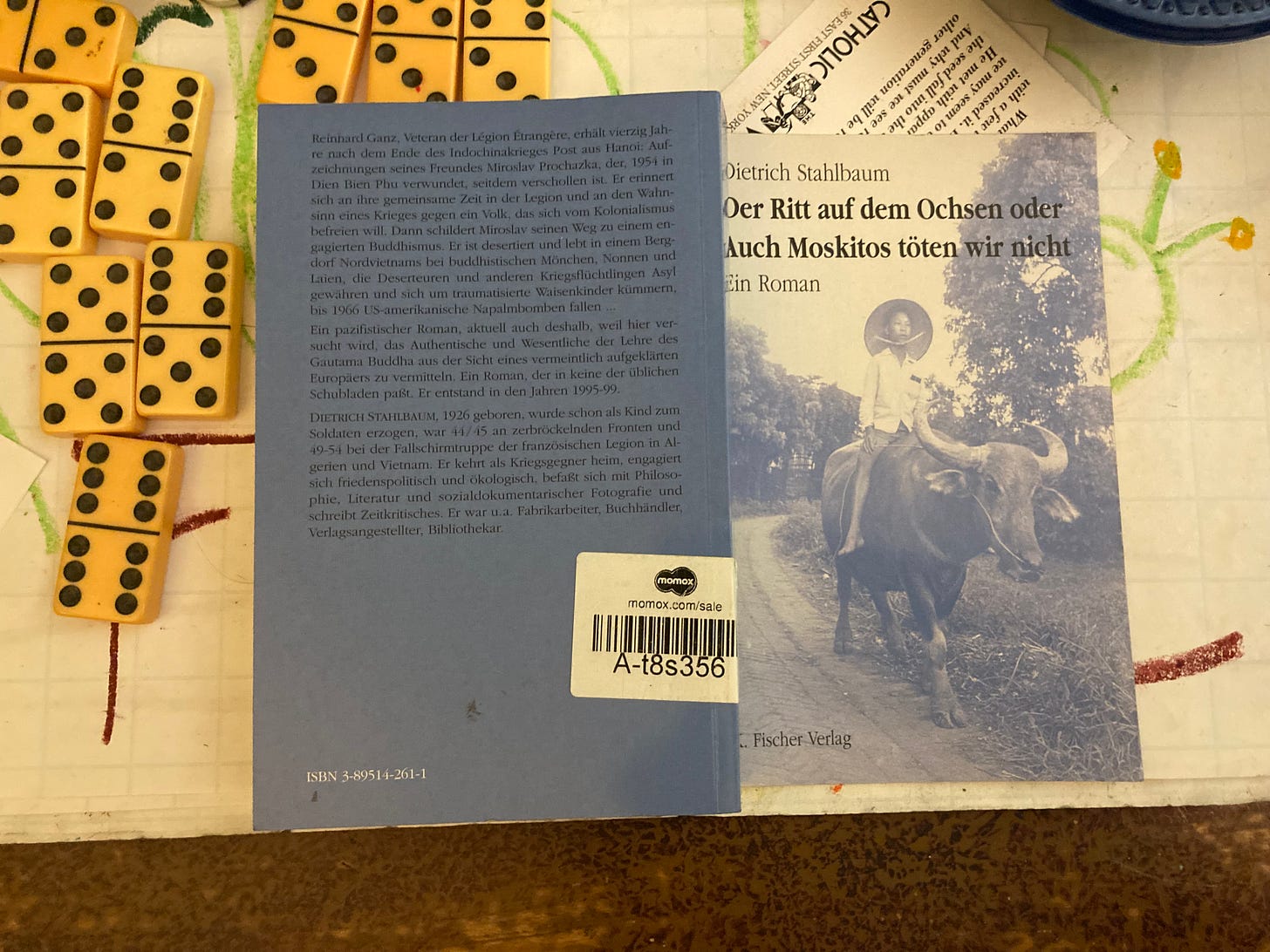Read a book from its back cover. What it’s for.
Reinhard Ganz, Veteran der Légion Étrangère, erhält 40 Jahre nach dem Ende des Indochinakrieges Post aus Hanoi: Aufzeichnungen seines Freundes Miroslav Prochazka, der, 1954 in Dien Bien Phu verwundet wurde und seitdem verschollen ist.
It’s German. So are the English language and, further back, French. All 3 share a modern lexicon drawn from literary Greek and Latin. Eyeballing this sentence, guessing, reading it aloud, sounds like it says here that
Reinhard Ganz, veteran of the Foreign Legion, 40 years after the end of the Indochina war [that would be the last French one] got a letter from Ha Noi: marked from his friend Miroslav Prochazka, wounded at Dien Bien Phu in 1954 and never seen since.
Always try first. Then run the German through the search engine in languages I read every day:
Reinhard Ganz, cựu chiến binh của Légion Étrangère, nhận được thư từ Hà Nội 40 năm sau khi Chiến tranh Đông Dương kết thúc: ghi chú của người bạn Miroslav Prochazka, người bị thương ở Điện Biên Phủ năm 1954 và mất tích kể từ đó.
Reinhard Ganz, vétéran de la Légion étrangère, reçoit du courrier de Hanoï 40 ans après la fin de la guerre d'Indochine: notes de son ami Miroslav Prochazka, blessé à Dien Bien Phu en 1954 et porté disparu depuis.
Reinhard Ganz, Veteranus Legionis Exterae, epistulas Ab Hanoi 40 annis post Finem Belli Indochinae accipit: notae ab Amico Suo Miroslav Prochazka, in Dien Bien Phu anno 1954 vulneratae et ab anno 1954 defuit.
Hey. Pretty good matches to my English guessing. Let’s try the next one. On the copy of the book shown above it says:
Er erinnert sich an ihre gemeinsame Zeit in der Legion und an den Wahnsinn eines Krieges gegen eine Volk, das sich vom Kolonialismus befreien will.
He remembers their time together in the Legion and the madness of a war against a people who want to free themselves from colonialism.
But in the product information online, the blurb continues instead:
Er erinnert sich an ihre gemeinsame Zeit in Algerien und Vietnam, an einen Krieg, der sie verändert, und an ein Volk, das sich vom Kolonialismus befreit hat.
He remembers their time together in Algeria and Vietnam, a war that changed them, and a people who freed themselves from colonialism.
Next sentence, on the book:
Dann schildert Miroslav seinen Wegzu einem engagierten Buddhismus.
Then Miroslav describes his path to a committed Buddhism.
That sentence online:
Im zweiten und dritten Teil des Romans schildert Miroslav seinen Weg zu einem engagierten Buddhismus.
In the second and third parts of the novel, Miroslav describes his path to a committed Buddhism.
The French search engine sticks closer to the German. Einem engagierten Buddhismus: un bouddhisme engagé.
The Vietnamese which the search engine gives, một Phật giáo cam kết, is more like the English, committed, pledged. That would be committed to Buddhism.
The German is about Buddhism committed to the world. To convey that sense in English we borrow the French engagé, a word of France and Germany’s mid-century of existentialism and resistance.
In the second and third parts of the novel, Miroslav describes his path to a Buddhism engagé.
Then, online:
Er ist mit Hilfe einer jungen Vietnamesin desertiert und lebt bis 1966 in einer buddhistischen Dorfgemeinschaft in den Bergen Nordvietnams. Am Ende wird auch das Friedensdorf in den Bergen Opfer militärischen Wahns.
He deserted with the help of a young Vietnamese woman and lived until 1966 in a Buddhist village community in the mountains of North Vietnam. In the end, the Peace Village in the mountains also becomes a victim of military madness.
But on the book:
Er ist desertiet und lebt in eined Bergdorf Nordvietnams bei buddistoschen Mönchen, Nonnen, und Laien, die Deserteuren und anderen Kriegslüchtflingen Asyl gewähren und sich um traumatisiert Waisenkinder kümmern bis 1966 US-amerikansiche Napalmbombenfallen …
He is deserted and lives in a mountain village of North Vietnam with Buddhist monks, nuns, and lay people who grant asylum to deserters and other warmongers and take care of traumatized orphans until 1966 US napalm bomb traps...
Let’s put all the information together and fiddle with the original text as well as the search engine translation:
Reinhard Ganz, veteran of the Foreign Legion, 40 years after the end of the Indochina war, got mail from Ha Noi in the hand of his friend Miroslav Prochazka, wounded at Dien Bien Phu in 1954 and never seen since.
Reinhard remembers their service together in Algeria and then the madness of the war in Viet Nam that changed both men, against a people who freed themselves from colonialism. In the second and third parts of the novel, Miroslav describes his path to a Buddhism engagé.
He deserted with the help of a young Vietnamese woman and lived until 1966 at a village in the mountains of northern Vietnam where Buddhist monks, nuns, and lay people gave asylum to deserters and cared for traumatized orphans. In the end, the Peace Village in the mountains also became a victim of military madness, a US napalm strike.
This was the second Viet Nam letter of 2 so far addressed to Der Ritt auf dem Ochsen by Diedrich Thalbaum. The second posted on October 26, 2022.
Viet Nam letters respects the property of others under paragraph 107 of United States Code Title 17. If we asked for permission it wouldn’t be criticism. We explain our fair use at length in the letter of September 12, 2022.
The colophon of these Viet Nam letters, directly above, shows the janitor speaking with poet David A. Willson on a Veterans Day.









Wow. So I do read like you, only slower/less prolifically. I often read back-to-front, as I was taught in classical Hebrew and Chinese. Spoilers notwithstanding, it exposes structure. Ditto with trying to decipher Latin-based languages before letting the machine do my work for me. The traditional doctor you met/stayed with in San Francisco instinctively did this too. It yields all kinds of interesting insights. Working with him every day [akin to Miroslav Prochazka in the book you're reviewing] was the only/best graduate school/apprenticeship I could have completed. If we'd all stayed in Woodbridge I would have similarly showed up at your door – as I did at your dad's – with incessant questions, being swatted away like a mosquito just confirming I was in the proximity of a deep vein of wisdom. It Takes a Village Indeed.....